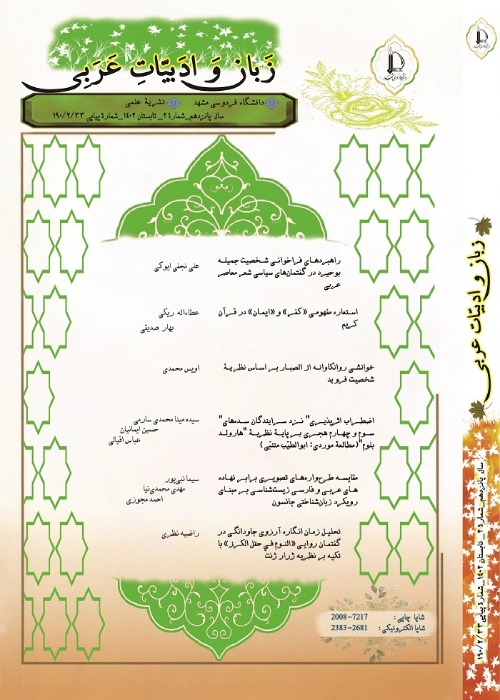Examining Critical-Structural Theorems from Ibn Khaldun’s View
The present inquiry is an attempt to examine critical-structural theorems through the views of Ibn Khaldun, the philosohoer, historiographer, and the theoretician of civil sciences. As a prominent critic, he has put forth a number of theories with respect to literary criticism. In his book, Muqaddimah (Prolegomena), he points out certain criticism criteria not as a philosopher, but as a critic; his comments and opinions can be explored in brief across these criteria. Ibn Khaldun has addressed, expressed and interpreted a number of critical and rhetorical criteria which demonstrated his inspiration from former philosophers of Andalusia. Critical criteria in his book, Muqaddimah, include the poetic queen, words and meanings, style, poetic style, prose, and the Holy Quran; accordingly, the following question can be posed: What are the criteria set by Ibn Khaldun in his critical theories? Given the hypothesis of the study, Ibn Khaldun has been able to formulate new theories and present new ideas in areas of defining poetry, explaining the concept of words and meanings, and differences between poetic devices, natural words, and artificial words, similar to the old critics. Subsequently, the purpose of this study is to examine Ibn Khaldun’s literary approaches and opinions in order to explain critical-structural theories through his point of view. As a part of the Arabic literature history, it appears necessary to address the critical perspective of this well-known author in the area of literary criticism.
Review of Literature:
The only available text on the criticism of Ibn Khaldun’s views written in Persian is titled, “Ibn Khaldun and Literary Criticism” which includes a short inquiry translated by Abbas, published in Keyhan Newspaper. In a paper titled, “al-Dhouq kima yarah Ibn Khaldun”, the author defines the concept of taste among critics and rhetoricians whilst pointing out Ibn Khaldun’s ideas in this regard. In the second section of another article titled, “Qira’ah fi Muqaddimah Ibn Khaldun an al-Adab va Naqdah”, the author writes about the concept of literature and its criticism from the perspective of Ibn Khaldun; being similar to another paper titled, “Ibn Khaldun Adiban Naqidan”, the author addresses the concept of literature and defines literary techniques such as poetry and prose as well as examining Arabic poetry and its conventions in different historical periods. In the fourth chapter, the author investigates Arabic poetry during various historical periods and then discusses Ibn Khaldun’s definitions on poetry. In a thesis titled, “Ibn Khaldun Naqidan”, the author presents a biography of Ibn Khaldun; in the third chapter, he addresses Ibn Khaldun’s views on the criticism and Arabic language sciences which involve syntax, linguistics, rhetoric, and literature. In another thesis titled, “al-Qazaya al-Naqdiyah ind filasifah al-Andelus”, the author ultimately addresses Ibn Khaldun’s critical-philosophical comments. Following the study of related literature and focusing on the most important points in similar research, the present study attempts to examine critical theorems of the old critics and their definitions in this context; next, Ibn Khaldun’s opinions are examined and the differences between the ideas of other critics before him are discussed. The approach adopted in this study is a comparative approach between Ibn Khaldun and other contemporary and former critics; subsequently, the present inquiry involves a set of comprehensive discussions.
In this study, it is attempted to describe and analyze Ibn Khaldun’s views on the areas of literature and criticism and study discussions related to the criticism of the Andalusia period with respect to the ideas of this 8th century (A.H.) prominent writer and critic, using credible literary and historical research. The conduct of the study through said approach can yield valid results which could be beneficial for other scholars in the area of literature.
According to the results of the study, in addition to areas such as history, civil sciences, and philosophy, Ibn Khaldun was also an expert in literature; he is an advocate of prioritizing words over meaning and has special insights around the definition of taste and style as criticism criteria as well as the styles of poetry, prose, and Quran. Examination efforts into Ibn Khaldun’s set of critical approaches and the accumulation of his views can offer a relatively comprehensive account of his literary-critical character.
Ibn Khaldun has drawn boundaries for each type of rhetorical and spoken techniques (poetry, prose, and Quran); according to his descriptions, each technique involves its own special styles. One of the innovative ideas of Ibn Khaldun in criticism is his rejection of a gift that most believe is granted to a writer or a poet. He uses the word “queen” as a replacement for this word.
Regarding the subject of words and meanings, Ibn Khaldun believes that verbal structures, whether in prose or in poetry, lie within words rather than meanings; subsequently, meaning is a function of words and the latter becomes the primary aspect. This shows his preference of words over meaning. Ibn Khaldun believes that as a criticism criterion, taste is not an inherent virtue to measure beauty and enjoyment; rather, taste is an acquired value for humans. He also believes that style is not created unless language compositions are completed; according to Ibn Khaldun, style is similar to a social phenomenon and he expresses its social aspects in poetic examples such as the beginning of ode with crying over homeland, whining, questioning and also poetic elements such as metaphor, similes, examples and descriptions. As for the relation between poetry and religion, he believes that there are very few, if any, imaginations in divine poetry; he expresses their meanings as common and clear in which no technique is used. The reason behind such an observation is that there is no need for poetic rules such as fantasies.
- حق عضویت دریافتی صرف حمایت از نشریات عضو و نگهداری، تکمیل و توسعه مگیران میشود.
- پرداخت حق اشتراک و دانلود مقالات اجازه بازنشر آن در سایر رسانههای چاپی و دیجیتال را به کاربر نمیدهد.



